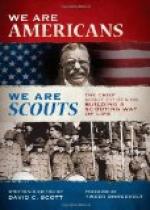I asked the Capt. what he was going to do with those wounded men. “I don’t see how you are going to get them to a doctor, and I don’t believe they will get well without one. So what are you going to do?”
He said if we could get them back to the settlement where we had left the horses, they could have a doctor’s care.
I said, “Well, but let’s get them something to eat as well as ourselves, for they must be faint for the lack of food and losing so much blood, and if they are no better by evening, I think you had better send for the doctor to come here and not try to send the men to him for treatment.” The Capt. agreed to this, and as soon as we had something to eat, I went to where the wounded men were laying and examined their wounds myself and was surprised to find the men so cheerful. They were laughing and talking just as if they were well.
I asked the one that was so badly wounded if he thought we had better send for a doctor to dress the wound. He said, “No, I don’t want any doctor. If you will get me a plenty of the balsam of fir to put on it, it will be well in a week.” I answered, “If that is all you want, my friend, I will see that you get all you want of that, for there is plenty of it all around us.”
I will say for the instruction of the reader that this birch taken from the fir trees as it saps out of cracks in the bark was the only liniment that the frontiersman had to heal his wounds at that time, and it was one of the best liniments that I have ever seen applied to a sore of any kind.
I now hunted up the Capt. to have a talk with him. I asked him what he proposed doing until those men were able to travel, as they didn’t want any doctor and said they could cure their wounds themselves with balsam of fir.
The Capt. said, “Well, we will leave enough men to guard the wounded men and the horses, and we will take the others with us and go and search for more Indians.”
Capt. McKee left ten men to guard the camp, and the balance of us struck out on a hunt for stray Indians.
We were gone from camp two or three hours, and we only found one Indian, and he was wounded, but we found a number of dead Indians scattered all through the timber where the men had shot them down as they ran, or as they met them in hand-to-hand combat.
After we got back to camp, I asked the Capt. what he was going to do with those horses.
He said he thought it would be the best plan to stay where we were until the men were able to travel and then to go back to the settlement and get our other horses and then pull for Dallas. “For,” said he, “I do not believe that the Indians will make any more raids through this part of the country until next spring, and they may never come back, for we have crippled them so that they will shun a place where they have met such disaster. There has never been a company through here that has had the success in killing Indians and capturing their horses as we have had this spring. Just think what we have done, and not one of our men has been killed.”




